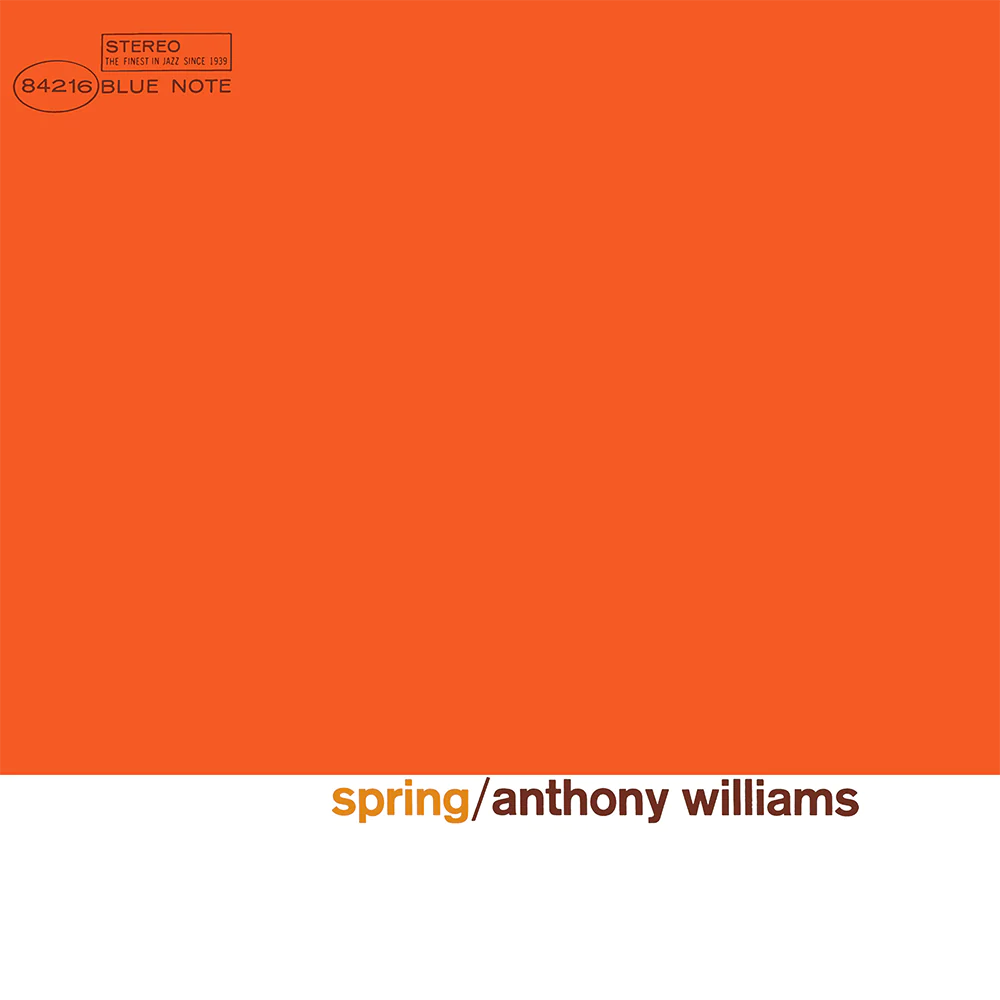Tony Williams' Baffling Masterpiece
The great drummer, at age 20, defying jazz gravity
Spring, drummer Tony Williams’ 1965 album on Blue Note, his second release as a leader, is a baffling recording. It’s a masterpiece. It reveals new angles, unlocks new mysteries on each listening. But beats me how or why it works.
Williams (who, at the time, went by “Anthony Williams”) is credited with composing all five tracks, but except for one of them, “Love Song,” which has the structure and grace of a song, it’s hard to detect just what parts of what we hear were composed. Nor do any of the pieces, with that one exception, have a center; or rather each of the band’s musicians—drums, bass, and two tenor saxophones, sometimes augmented by piano (and more about them in a bit)—occupies a center, steering things his own way (you should listen to the album at least five times, focusing on a different player each time), yet it all hangs together, it all rivets and dazzles and (in its own strange way) swings.
I’ve really never heard anything like it.
The album sports an all-star cast, though they weren’t all stars at the time: Wayne Shorter and Sam Rivers on tenor sax, Gary Peacock on bass, and Herbie Hancock on piano. Williams—who, remarkably, was 20 years old at the time—had been playing with Shorter and Hancock in Miles Davis’ band for a year. He’d played with Rivers in Boston since he was 15 and had been sideman on Rivers’ ’64 Blue Note album, Fuchsia Swing Song. (“Love Song,” which Rivers carries as a melody, was clearly Williams’ torch to that session.) Peacock had backed some of the era’s most progressive musicians, including Paul Bley and Albert Ayler. (He later played in Keith Jarrett’s Standards Trio.)
All of these musicians were exploring the most adventurous harmonies, in jazz and classical music, and here was an opportunity—untethered from older, more conventional players—to test the ideas in the studio. (In this sense, Hancock, Shorter, and Williams were way out in front of Miles, who belittled Ornette Coleman and Eric Dolphy until Williams in particular dragged him in their direction in his search for a new sound.)
Williams’ first album as a leader, Life Time, recorded a year earlier, on Blue Note, was also a strikingly abstract album but one that took off in myriad directions, with different combinations of players, in different ensembles, plowing through different musical fields. Spring is more thought-through, cohesive—in some ways as minimalist as its packaging: squares of white and blood orange on the front cover, a large grainy photo of Williams on the back cover with (unusual for Blue Note back then) no liner notes. (I have scrounged for any contemporary accounts of this session or interviews with its players soon after, to no avail.)
By this time, whatever the views on his music, Williams was raising eyebrows as one of the most innovative drummers—in the same company as Max Roach, Billy Higgins, Ed Blackwell, and Paul Motian—with a particular flair for polyrhythms, which he could stagger at radical angles without losing the beat.
Shorter was laying complex harmonies and rhythms over sharp-hooked melodies in his work with Miles Davis’ quintet (E.S.P., the first Miles album to feature several Shorter compositions, was recorded earlier in ’65). But Spring jarred him into new territory, a blend of high energy and free (but still structured) jazz that his original mentor and Miles-band predecessor, John Coltrane, was exploring around this time.
This is a bold release for Blue Note’s Classic Vinyl series, and the sound quality is excellent. There’s air around all the players. Williams’ drumkit is a bit to the rear; you can hear all of its elements, whether brush-whisked or stick-whacked, as well as all the tunings and colors that Williams eked from skins and cymbals. The horns are vivid and brassy, the bass clear and plucky (listen closely to Peacock’s pedals and pivots!). Even the piano, which sometimes comes off a bit hooded on Rudy Van Gelder productions, is percussive and warm.
Williams didn't lead another recording session until 1969 (his time in Miles' band kept him busy), and then, with Emergency!, he turned in a completely different direction as a jazz-rock fusion pioneer. Over the subsequent years, he led bands of wide variety, co-led the Great Jazz Trio (with Hank Jones and Ron Carter), reunion bands with Carter and Hancock, and generously did sideman gigs with hosts of young up-and-comers. He died in 1997, at age 51, of a heart attack following gall bladder surgery
Besides many other things, Spring is a one-off. Give it a chance, then give it a few more. It will pay back whatever you put into it.
(Here's Williams' band Lifetime at the Montreux Jazz Festival 1971. It has nothing to do with this record but it's amazing nonetheless—with Larry Young on organ. The individual who posted this less than excellent video managed to graft onto it a high quality board mix. The sound is very good!_ed.)










































.png)








